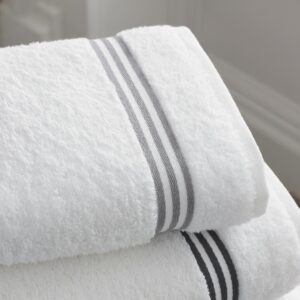Laundry Lessons: How Detergent Decisions Influence Eczema Irritation
Laundry and Eczema: The Overlooked Link
For many people with eczema, the skincare journey focuses on creams, cleansers, and climate—but there’s one hidden culprit that often flies under the radar: your laundry routine.
Every shirt, pillowcase, or bedsheet you touch has been immersed in detergent, fabric softener, and rinse water. If these products contain harsh ingredients, they don’t just rinse away—they cling to fabric fibers. The result? Prolonged, low-grade exposure to skin irritants that can sabotage your eczema management around the clock.

Understanding how your laundry routine affects your skin can be a game-changer in reducing flare-ups and rebuilding your skin barrier. Here’s how to make your laundry a partner—not a trigger—in your eczema care routine.
The Irritant Ingredients Hit List
Most mainstream laundry products are designed for visual and olfactory impact: bright, clean clothes with long-lasting fragrance. Unfortunately, many of the chemicals used to achieve these effects are problematic for sensitive or compromised skin.
Here are the top offenders to avoid:
Fragrance & Masking Scents
Often listed vaguely as “parfum” or “fragrance,” these are the most common contact allergens in laundry products. They can remain embedded in fabric and transfer to skin for hours after wear. “Unscented” products can still include masking agents to neutralize smell—look specifically for “fragrance-free.”
Optical Brighteners
These synthetic chemicals bind to fabric and reflect light, making clothes appear “whiter and brighter.” Unfortunately, they also coat fibers with fluorescent residues that can irritate eczema-prone skin.
Enzymes (Protease, Amylase, Lipase)
While great for breaking down organic stains, these enzymes can degrade natural skin proteins, especially when the skin barrier is already compromised—a hallmark of eczema.
Preservatives
Ingredients like methylisothiazolinone and benzisothiazolinone are increasingly recognized as contact sensitizers. They extend shelf life, but they also rank high among causes of allergic dermatitis (Lundov et al., 2011, Contact Dermatitis).
Safer Suds Strategy
The good news? You don’t have to give up clean clothes to avoid eczema triggers. You just need a safer approach to your wash routine. Here’s how:
Choose “Free & Clear” Formulas
Look for liquid or pod-based detergents labeled “free & clear” or “hypoallergenic.” Powdered detergents may leave more residue in hard water conditions.
Use Half the Recommended Dose
More detergent doesn’t mean cleaner clothes—especially for sensitive skin. Excess suds may not rinse out fully, increasing skin exposure to residue. Try using half the standard dose and evaluate results.
Add a Second Rinse Cycle
If your washer has a “second rinse” or “extra rinse” option, use it regularly. This simple tweak can dramatically reduce chemical residue in clothes.
Wash New Garments Before First Wear
Even clothing labeled “organic” or “natural” may be treated with preservatives, dyes, or resins. Always launder new items—sometimes twice—before wearing.
Fabric-Softener Facts
Fabric softeners may make clothes feel smoother, but they’re often loaded with fragrance and quaternary ammonium compounds (quats)—both known eczema triggers. These cling to fabric and release irritants with every wear.
Safer Alternatives:
- Wool dryer balls: Soften clothes naturally and reduce static.
- White vinegar: Add ¼ cup to the rinse compartment as a natural softener and odor remover.
Hard Water Helpers
If you live in a region with hard water, you may face an extra challenge. Minerals in the water can bind to surfactants in detergent, making them less effective and harder to rinse away. This can leave behind irritant residues on your clothes.
Try These Fixes:
- Washing soda (¼ cup): Boosts water softness and improves rinse performance.
- Whole-home water softener: A long-term solution that also benefits hair, skin, and appliances.
You can check your water hardness with inexpensive test strips from most hardware stores.
Travel & Shared Laundry Rooms
Shared washers in hotels, laundromats, or campus laundry rooms often contain residual detergent from previous users, which may include heavily fragranced or enzyme-based products.
Tips for Safer Laundry on the Go:
- Pack single-use hypoallergenic pods to avoid unfamiliar products.
- Run an empty “rinse only” cycle before your load to flush leftover detergent.
- Bring a large laundry bag or pillowcase to wash delicate or skin-contact garments separately.
Eczema-Proofing Your Laundry: Simple, Sustainable Steps
It can feel overwhelming to overhaul your entire laundry routine, but the key is to start small and build gradually. Try implementing one change per week and track your flare-ups. You may notice improvements in skin comfort by the third or fourth wash cycle.
If you’re looking for other lifestyle tips that support eczema management, check out this article for treatment tips.
Final Thoughts: Transform Laundry from a Trigger to a Tool
Laundry isn’t just a background task—it can be a hidden battleground for people managing eczema. Fortunately, by being strategic about the products you use and the steps you follow, you can eliminate a common source of irritation and reduce your overall symptom burden.
Eczema thrives on exposure to irritants. But thoughtful tweaks—like switching detergents, cutting fragrance, or adding a rinse cycle—can transform clothing from a source of inflammation to a soft, breathable shield. Once you experience the difference, you’ll never go back to your old laundry habits.
Our Promise to You
We’re confident our products will transform your skin—but if you’re not completely satisfied, we’ve got your back. Simple as that. Try our products risk-free for 30 days. If you don’t love your results, reach out to our care team and we’ll make it right with a full refund. No questions asked, no complicated returns process. Because everyone deserves skincare that works.

